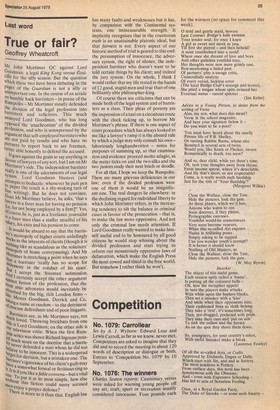True or fair?
Geoffrey Wheatcroft
Mt John Mortimer QC against Lord Goodman: a legal King Kong versus 6odzilla for the silly season. But the question which the two have been debating in the Pages of the Guardian is not a silly or unimportant one. In the course of an article on humble hack barristers—in praise of the kompoles — Mr Mortimer stoutly defended the division of the legal profession into barristers and solicitors. This much annoyed Lord Goodman, who has long °PPosed the 'anachronism' of the divided Profession, and who is unimpressed by the argument that self-employed barristers who are not paid by results and who have no Partners to report back to are freemen, better able honestly to defend the accused. It goes against the grain to say anything in favour of lawyers of any sort, but lam on Mr Mortimer's side. The independent barrister really is one of the adornments of our legal system, Lord Goodman blusters (and attempts to bedazzle: whenever he puts pen ,,t° Paper the result is a shy-making turn of line writing), But he does not convince. 11)(3es Mr Mortimer believe, he asks, 'that a a'A'yer is a freer man for having no pension r for not being employed by a firm ]?' Yes, f course he is, just as a freelance journalist 15,,a freer man than a staffer mindful of his salary, his exes and his pension to come. It would be absurd to say that the barris,Tr's Monopoly of higher courts unfailingly works in the interests of clients (though it is n°thing like as scandalous as the solicitors' 111‘11°110Poly of house conveyancing). And Mr tht3rtimer is stretching a point when he says di4t a barrister 'really has no scope for 8shonesty in the conduct of his cases'. A ut I accept the 'freeman' submission. a ncl. I certainly accept the other argument ,g4Inst fusion of the profession, that the -"ab(3st able advocates would inevitably be 14,41i-bed by the big, rich London firms — tle. Messrs Goodman, Derrick and Co, a 0,Nng a name at random — to the detriment 'obscure defendants and of poor litigants. barristers are, as Mr Mortimer says, not silli,tich loved. Throwing brickbats from one e,"le is Lord Goodman; on the other side is :It television critic. When the first Rum1-"e series was shown Richard Ingrams pour much ter n scorn on the doctrine that a barns Cr defended a man whom he did not e t,_'leve to be innocent. This is a widespread Lgget for derision, but a mistaken one. The ar rrister's ignorance of his client's guilt may igta, \,.'e,a somewhat formal or fictitious ring to (1),It Is if you like a fable convenu —but a vital ‘‘,";,e,: To put it at its most simple, how else 'eulout this fiction could many accused _9 enjoy a proper defence? There is more to it than that. English law has many faults and weaknesses but it has, by comparison with the Continental systems, one immeasurable strength. It implicitly recognises that in the courtroom truth is an unattainable platonic ideal, but that fairness is not. Every aspect of our historic method of trial is geared to this end: the presumption of innocence, the adversary system, the right of silence, the independent barrister who doesn't want to be told certain things by his client; and indeed the jury system. On the whole, I think I would rather that my life rested in the hands of 12 good, stupid men and true than of one brilliantly able philosopher-king.
Of course there are criticisms that can be made both of the legal system and of barristers as a class. Their pleas of poverty are the impression of a taxi on a circuitous route with the clock ticking up, to borrow Mr Mortimer's phrase. If there is one aspect of court procedure which has always looked to me like a lawyer's ramp it is the absurd rule by which a judge may only consult his own — laboriously longhandwritten — notes for purposes of summing up, so that examination and evidence proceed molto adagio, as the meter ticks on and the two silks and the two juniors study their next briefs or doodle.
For all that, I hope we keep the Rumpoles. There are many grievous deficiencies in our law; even if the divided profession were one of them it would be an insignificant one. The real dangers lie elsewhere: in the declining regard for individual liberty to which John Mortimer refers, in the increasing tendency_ to tilt the balance in criminal cases in favour of the prosecution — that is, to make the law more oppressive. And not only the criminal law needs attention. If Lord Goodman really wanted to make himself useful and to be honoured by all good citizens he would stop whining about the divided profession and start trying to reform our monstrously oppressive laws of defamation, which make the English Press the most cowed and timid in the free world. But somehow I rather think he won't.






























 Previous page
Previous page